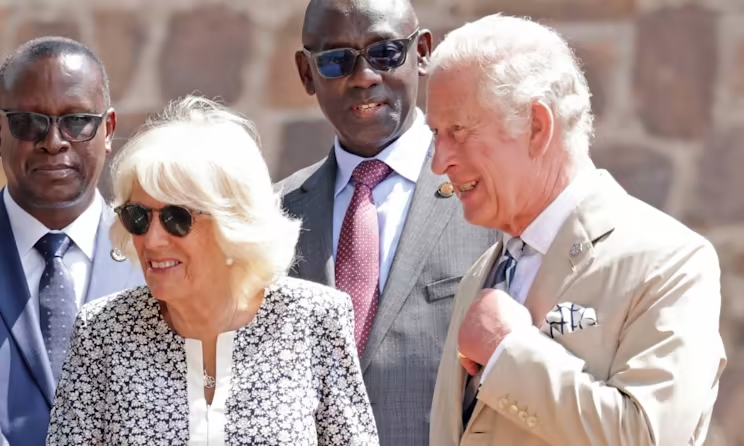The Prince of Wales joked after being set up for a
photograph among bamboo trees, saying: “I feel slightly bamboozled.”
Posing for the image at the request of The Sun’s royal
photographer Arthur Edwards, the heir to the throne leaned against one of
the trees, saying, “I feel I need to hold onto something.”
Charles was visiting an agroforestry site run by the
Albertine Rift Conservation Society, which has transformed local farmland in
the Bugesera district of Rwanda by planting crops among trees.
He was shown around the three-acre plot by Dr Sam
Kanyamibwa, Executive Director of ARCOS and the organization’s Director of
Community Engagement Brigitte Kanyamugenge.
He also met Jean Bosco Murenzi, President of the Koimizanya
cooperative – a group of 100 local farmers including 45 women – who are working
with ARCOS to restore land on the edge of the wetland of Busegera Lake.
The partnership, which is supported by Rwanda’s government,
has boosted income, yield and biodiversity in just six years since the project
began in 2016.
The Prince, a keen gardener and farmer himself, was
fascinated by their work and stopped to admire saplings being grown in the
centre’s tree nursery, including avocado, and orange and lemon trees.
He was told how the cooperative had been very disorganized
at the start, but was now much better organized and had a vision. “And
a lot more soil!” said Charles. “I’m fascinated by all these species,
do they all have different properties? You have to protect them with
shade.”
He was then shown before and after photographs of the
landscape before the project began and now, showing the stark difference.
In 2016, the land was very dry and the soil was of poor
quality as a result of farmers planting maize, beans and other crops in the
wetland.
 |
Charles and Camilla are on their first royal tour of Rwanda
Now the natural vegetation and wildlife of the wetland has
been completely restored as the farmers instead use land alongside it which has
better soil as a result of their new techniques and a solar-powered irrigation
system.
“We learned about managing the environment in a better
way,” Jean Bosco told him. “I’m so glad I got to see what you are
doing,” replied the Prince.
Charles ran a handful of soil through his fingers to
compare the degraded version from before to the nutrient-rich soil produced by
the cooperative by adding organic matter and avoiding artificial
fertiliser. “That’s why I went organic nearly 40 years ago,” he
said. “It (the soil) was degraded.”
He was joined for the visit by Juliette Kabera, Director
General of the Rwanda Environment Management Authority and Rwanda’s Minister of
Environment Mujawamariya Jeanne d’Arc, who told the future king: “The
restoration you are advocating for, your Royal Highness, you can see how it is
being implemented. It’s wonderful.”
Charles also met some of the farmers working the land and
heard from them how they have seen more fertile soil, more wildlife and
vegetation and more rainfall as the water table has risen since the partnership
with ARCOS began.
The Prince then spoke to Stephane Hallaire, President of
Reforest’Action to discuss the launch of the Circular Bioeconomy Alliance’s
Living Lab in Rwanda.
They were joined by Barbara Nel from Astra Zeneca, which
supports the Circular Bioeconomy Alliance, although she told Charles the
company was “still working on the vaccine”. “It’s very
important as I get older,” joked the Prince, who has had Covid twice.
Dr. Sam Kanyabimwa said afterward: “It was so
inspiring to talk to the Prince. They (the farmers) were telling him they have
seen the change, particularly in the environment. They have more food, fresh
air and feel so encouraged.”
Rwanda is the second-most densely populated country in
sub-Saharan Africa and has steeply sloping agricultural land, with a high risk
of soil erosion.
 |
The royals arrived in Rwanda on Tuesday
About 30 percent of the country is forested, but there is
limited land to expand forest plantations with a growing population that
depends on wood for cooking. But more than 45 percent of Rwanda’s 2.4million
hectares of land is potentially suitable for agroforestry, which would improve
land for farming while boosting the forest.
Rwanda was the first African country to declare a target
for land restoration in 2011 and has an Agroforestry Strategy in place, but
needs investment in research and training to implement techniques on a large
scale.
Founded in 1995, ARCOS Network works to improve
biodiversity conservation and sustainable management of natural resources in
Uganda, Rwanda, Burundi and the Democratic Republic of Congo. Its motto is
Collaborative Action for Nature and People.







